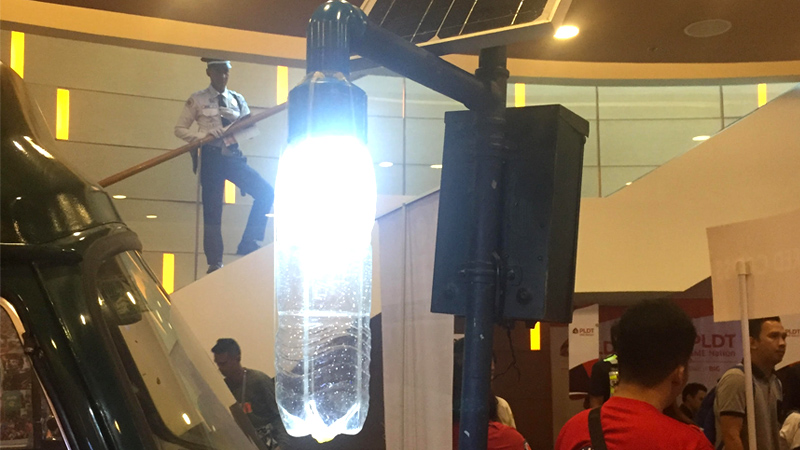Image may be NSFW.
Clik here to view.
MANILA, Philippines – Social entrepreneur Illac Diaz, founder of the group Liter of Light, urged officials and advocates to teach communities how to rebuild their homes and assemble structures such as lighting after disasters.
"When calamity strikes, the people who mostly rebuild villages and homes (are those who have lost them). (They) really build it themselves," Diaz said on Friday, July 8, the first day of the Agos Summit on Disaster Preparedeness.
Diaz, who advocates sustainable lighting, explained that teaching people to rebuild their homes can make it cheaper to reconstruct towns and cities.
He added that teaching them to rebuild their communities with easy-to-find resources – such as plastic bottles, soil, and bamboo – can do away with the high costs of shipping materials to disaster-stricken areas.
"First of all, 50-70% of your cost is just shipping (the materials). So you put it in a container van, you put it in a box, you ship it. It comes here into the Philippines, plus taxes – how do you think they make money?" Diaz said.
Image may be NSFW.
Clik here to view.
Diaz said, too, that teaching individuals how to reconstruct buildings and access to utilities can sustain not only the structures themselves, but also the community's livelihood.
“If you have to import all the time, you'll notice that your lights would always break, and you'd have to buy a new one because that's their business model," said Diaz.
He added, "How is it that we take away the solution that one person, one company can supply you with, and move it to every local government, province, (so that) they can build their own solar lights as a social entrepreneurship and they can build their own street lights, their house lights, and of course study lights?"
In connection with another project of his, called MyShelter Foundation, Diaz decided to make use of plastic bottles left over from shipments of humanitarian goods.
For every 5 bottles used to rebuild structures, one is used to create a solar-powered light source.
Disaster preparedness
During the Agos Summit, Diaz also said it is important to learn to transform everyday objects into useful items during disasters and emergencies.
Clik here to view.

"Even in disaster, it's not just clothes or food (needed), but especially here in Metro Manila, if there's a massive earthquake, it's not that you'll be able to go to your 7-Eleven and buy batteries. You really have to start teaching people, especially in a massive disaster, to be able to make their own lights," he said.
For example, Liter of Light has used not only plastic bottles, but also discarded batteries still in working conditon. The recycled batteries, which help to power different models of solar lights, come from devices like e-cigarettes, computers, and emergency lights.
Recently, Liter of Light also started to convert lamparas or kerosene lamps into solar powered lights.
As these lamparas are fire hazards, Diaz noted that their target was to teach people how to convert kerosene lamps into solar lights.
Liter of Light is present in several countries all over the world, and has helped give light to about a million homes worldwide.
The Agos Summit on Disaster Preparedness brought together key stakeholders to tackle key issues and share best practices, which aim to achieve a zero-casualty outcome when calamities strike.
The summit was organized by MovePH, Rappler's civic engagement arm, and ran until Saturday, July 8. – Rappler.com
Clik here to view.
 Image may be NSFW.
Image may be NSFW.Clik here to view.
 Image may be NSFW.
Image may be NSFW.Clik here to view.
 Image may be NSFW.
Image may be NSFW.Clik here to view.
 Image may be NSFW.
Image may be NSFW.Clik here to view.

Clik here to view.
